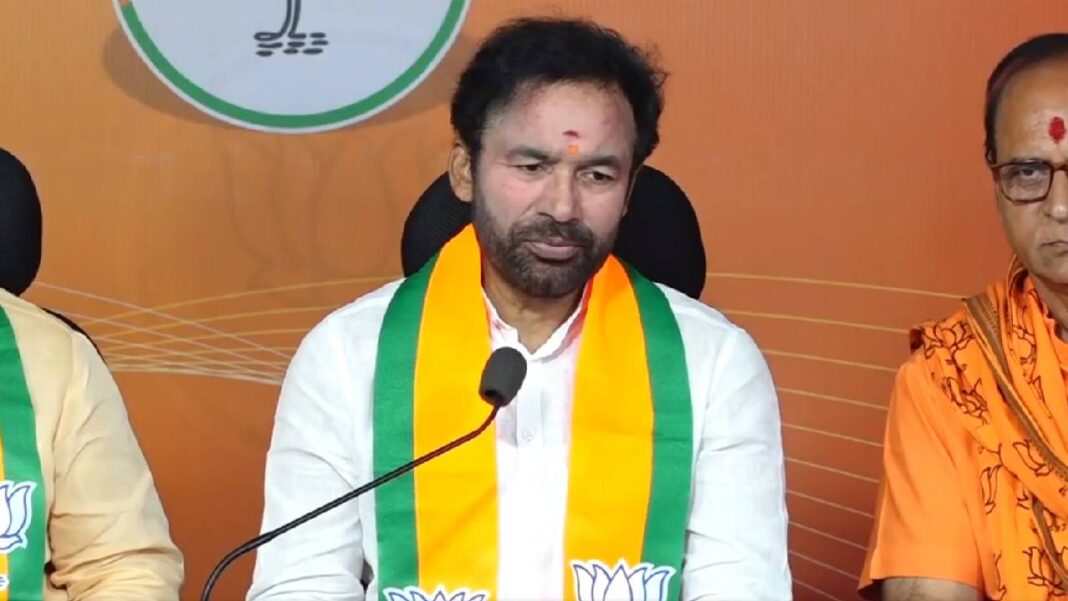PNS|Hyderabad
Telangana has been sanctioned three new institutions. They are the Global Centre for Excellence on Millets, the Railway Kavach Project Centre for Excellence and the National Skill Institute, Union Minister Kishan Reddy said.
He said the Centre is setting up a Global Centre for Excellence on Millets with an outlay of Rs 250 crore to encourage millets cultivation in the state.
“The Railway Kavach Project Centre for Excellence is also coming to Secunderabad. The Centre has already released Rs 41 crore, and Rs 274 crore was sanctioned later,” Kishan added.
Addressing the media at the state BJP office here on Friday, he said the ‘PM Shri Anna’ scheme was launched on March 18, 2023, to promote the use of millets.
“The IIMR is researching millets under ICAR supervision. The newly set up global centre will play a key role in continuing this research effectively. Once this centre becomes operational, research, development and infrastructure creation for millets will be carried out rapidly. This centre, which is to be set up in Hyderabad, will have a Central Instrumentation Lab, International Hostel, Millets Museum, Research Farms, Training Rooms and International Guest House. Modern research facilities like gene editing, greenhouses, speed breeding labs and phenomics labs will also be available. Quality seeds for millets cultivation will be provided, especially to Telangana farmers. Along with IIMR, this new centre will provide training to farmers, support for marketing of value-added products, and encouragement for start-ups,” he said.
Kishan said the Centre is focused on introducing the Kavach project for railway safety.
“A ‘Kavach Centre of Excellence’ is going to be launched in the Secunderabad parliamentary constituency, which Kishan represents. The Centre has sanctioned Rs 41 crore for this now, and Rs 274 crore for the entire project. The Centre will undertake extensive research on the Kavach technology being developed domestically. Training for railway loco drivers and technicians, and special training programmes will be conducted in partnership with educational institutions. A system will be put in place to monitor approvals, research, design, and specifications of small and medium-sized companies for the development of Kavach technology,” he said.
“India has the third-largest railway network in the world after the US and China. The Centre is trying to develop Kavach technology as a model for the world. Special training and certification courses will be provided to engineering students in subjects like railway signalling. The Kavach Centre of Excellence has signed agreements with the Mahatma Gandhi Institute of Technology (Hyderabad), the Madan Mohan Malviya University (Gorakhpur) and the MBM University (Jodhpur),” he said.
“ITIs have been functioning since 1950, providing vocational education. The Centre is trying to increase the number of these educational institutions. With a growth rate of 47% in the last three and a half years, the number of ITIs across the country has reached 14,600. Out of this, 3,316 are government ITIs, which are functioning in 681 districts. While the number of students enrolled in ITIs in 2014 was nine lakh, it has now increased to 14.4 lakh. The Centre has prepared a plan for upgrading ITIs across the country at a cost of Rs 60,000 crore. In this context, training centres will be set up in Hyderabad, Bhubaneswar, Chennai, Kanpur and Ludhiana. These centres will try to create the modern infrastructure required for ITIs, along with the ‘Training for Trainers’ programme,” Kishan said.




